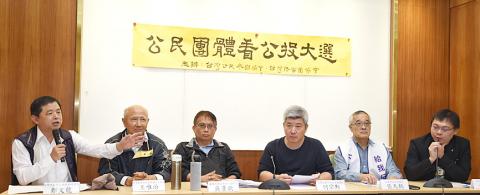A coalition of civil groups yesterday accused the Central Election Commission (CEC) of interfering with referendum proposals and called on all members of the executive committee to step down.
“I had hoped that the amendments would break the birdcage, but then I found there were still many ways the commission could interfere with a proposal,” Aletheia University Department of Law associate professor Wu Ching-chin (吳景欽) told a news conference in Taipei, referring to amendments to the Referendum Act (公民投票法) passed last year that significantly lowered the threshold for initiating referendums and abolished an Executive Yuan referendum review committee.
The law had been known as a “birdcage act” due to many previous restrictions that had made it nearly impossible to initiate or pass a referendum.

Photo: Liu Hsin-de, Taipei Times
A referendum question he submitted to the commission in April asking the government to return surplus tax revenue to members of the public was rejected on the grounds that the word “surplus” is suggestive and that questions related to taxes are banned by law, Wu said.
He told the commission that “surplus tax revenue” was the same term used by the Ministry of Finance and that the government has been using it for 40 years, but his opinion was ignored, he said.
The commission also did not offer any explanation as to why it would contravene the law to ask questions related to taxes, he said.
“My referendum question did not concern increasing or cutting taxes, or even government budgets. It would only require the government to pass legislation that clarifies where the surplus comes from and where it should go,” Wu said.
Meanwhile, Nuclear Myth Busters founder Huang Shih-hsiu (黃士修), who initiated a referendum to scrap the government’s plan to phase out nuclear power that passed on Saturday, accused to the commission of trying to “oppress certain proposals.”
While Huang’s proposal asked: “Do you agree that Subparagraph 1, Article 95 of the Electricity Act, which reads: ‘Nuclear-energy-based power-generating facilities shall wholly stop running by 2025,’ should be abolished?” the commission had initially required him to remove the phrase describing the content of the cited law, saying it would prevent it from being objective or neutral, he said.
“They simply did not want voters to immediately understand that the question was about the ‘nuclear-free homeland by 2025’ policy,” Huang said.
The commission was unfair in its handling of referendum proposals and its members are unqualified to remain in their posts, Taiwan Citizen Participation Association director-general Ho Tsung-hsun (何宗勳) said.
“All members of its executive committee should step down. Simply having the commission chairman step down is not enough to appease the public’s anger,” Ho said.

An essay competition jointly organized by a local writing society and a publisher affiliated with the Chinese Communist Party (CCP) might have contravened the Act Governing Relations Between the People of the Taiwan Area and the Mainland Area (臺灣地區與大陸地區人民關係條例), the Mainland Affairs Council (MAC) said on Thursday. “In this case, the partner organization is clearly an agency under the CCP’s Fujian Provincial Committee,” MAC Deputy Minister and spokesperson Liang Wen-chieh (梁文傑) said at a news briefing in Taipei. “It also involves bringing Taiwanese students to China with all-expenses-paid arrangements to attend award ceremonies and camps,” Liang said. Those two “characteristics” are typically sufficient

A magnitude 5.9 earthquake that struck about 33km off the coast of Hualien City was the "main shock" in a series of quakes in the area, with aftershocks expected over the next three days, the Central Weather Administration (CWA) said yesterday. Prior to the magnitude 5.9 quake shaking most of Taiwan at 6:53pm yesterday, six other earthquakes stronger than a magnitude of 4, starting with a magnitude 5.5 quake at 6:09pm, occurred in the area. CWA Seismological Center Director Wu Chien-fu (吳健富) confirmed that the quakes were all part of the same series and that the magnitude 5.5 temblor was

The brilliant blue waters, thick foliage and bucolic atmosphere on this seemingly idyllic archipelago deep in the Pacific Ocean belie the key role it now plays in a titanic geopolitical struggle. Palau is again on the front line as China, and the US and its allies prepare their forces in an intensifying contest for control over the Asia-Pacific region. The democratic nation of just 17,000 people hosts US-controlled airstrips and soon-to-be-completed radar installations that the US military describes as “critical” to monitoring vast swathes of water and airspace. It is also a key piece of the second island chain, a string of

The Central Weather Administration has issued a heat alert for southeastern Taiwan, warning of temperatures as high as 36°C today, while alerting some coastal areas of strong winds later in the day. Kaohsiung’s Neimen District (內門) and Pingtung County’s Neipu Township (內埔) are under an orange heat alert, which warns of temperatures as high as 36°C for three consecutive days, the CWA said, citing southwest winds. The heat would also extend to Tainan’s Nansi (楠西) and Yujing (玉井) districts, as well as Pingtung’s Gaoshu (高樹), Yanpu (鹽埔) and Majia (瑪家) townships, it said, forecasting highs of up to 36°C in those areas